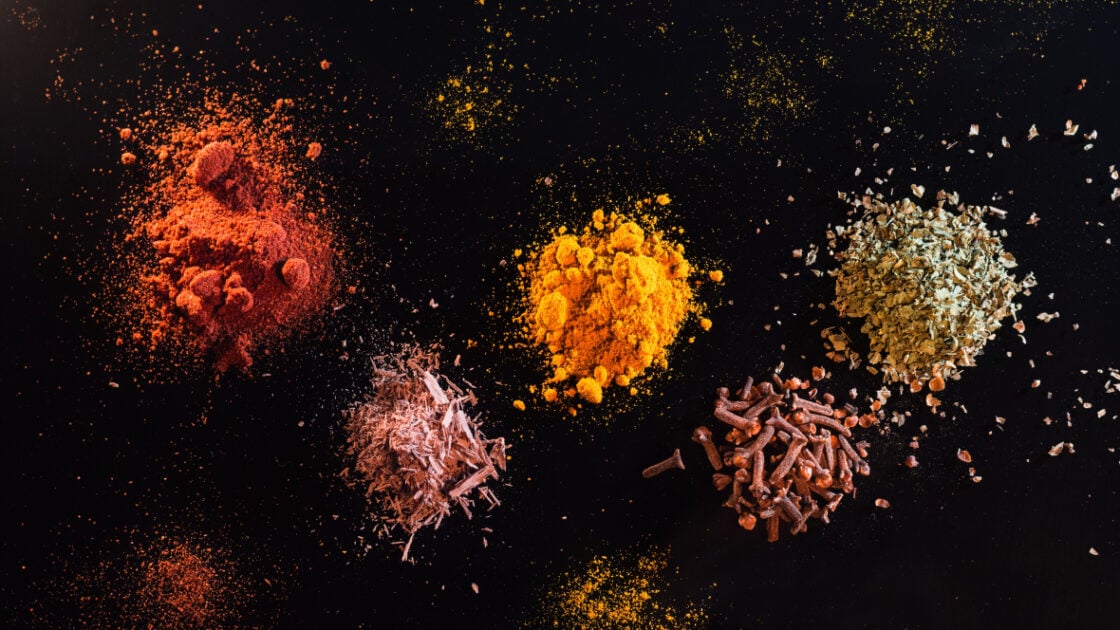Plant-Based Indian Foods May be the Best Mood Lifting Food, Here’s Why
Redolent with spices and chiles, Indian Cuisine may be the best way to kick up your mood in the kitchen.

In the mood for a good mood? Aside from being just plain delicious, Indian food is really good for your mental health – in more ways than one.
Of course, the category of “Indian food” actually encompasses the varied regional cuisines of nearly 30 different states within the subcontinent. Different regions offer different ingredients and styles of cooking and thus will have different health benefits. But there are a few overarching – and, yes, even a few unifying – health benefits that you’ll find no matter which Indian food you choose. And many of them are linked to improved mood.
1. Spices
While no two recipes – and indeed, no two cooks! – will have exactly the same spice blend, Indian cuisine does make great use of a number of different mood-boosting spices.
The first is turmeric, which lends a lovely golden color to dishes like dals and, with its mild, almost buttery aroma, is present in many masalas or spice blends alongside more assertive spices.
Turmeric has long been attributed with anti-inflammatory benefits thanks to its active component, curcumin, which is even more bioavailable when paired with the pepper so common to many Indian cuisines. And according to UCLA researchers, thanks in part to these anti-inflammatory compounds, turmeric can significantly boost your mood.
“Since this spice has anti-inflammatory properties and reduces brain inflammation, the chances of depression are lowered resulting in happiness,” explains Megan Ayala, Fitness & Health at Patricia and Carolyn.
Cinnamon is another anti-inflammatory spice found notably in garam masala. Research shows that cinnamon can help stabilize your mood, even combatting anxiety and depression. (And you know what that means: apple pie is medicine.)
Chile is omnipresent in Indian cuisines, whether dried or fresh, mild or hot. Chile is linked to improved mood thanks to the presence of capsaicin – the compound that lends Indian food its heat. So fans of spicier dishes like vindaloo are in luck!
“Spicy food increases the body’s natural production of hormones such as serotonin which are responsible for keeping stress, depression, and anxiety levels at bay,” explains Dr. Mubashar Rehman Ph.D., a medical researcher & writer at HealthCreeds.com.
Rehman adds that the spiciness of Indian food also promotes the creation of a fatty acid neurotransmitter called anandamide which, Rehman notes, has been shown to lead to fewer problems related to bowel affections like Crohn’s disease or ulcerative colitis. And that can boost your mood in more ways than one.
2. Vegetarian Food and Pulses
While most curry house menus might have you thinking otherwise, in many Indian regions, vegetarian food reigns supreme. Surveys indicate that somewhere in the ballpark of 40 percent of the Indian population is vegetarian, and it’s not hard to see why. From chana masala to five-lentil dal to aloo matar, Indian food offers a rich choice in vegetarian food. And that means that an Indian food diet is often a fibrous one.
Lentils, pulses, cauliflower, peas, and more are staples of Indian food, and these vegetables boast loads of fiber. We all know fiber is essential to make bathroom time less, er, complicated, but fiber is also a major key to improved mood.
Recent studies have begun to lend credence to a belief pervasive in traditional medicine systems around the world: that idioms like “butterflies in your stomach” are rooted in a very real mind-gut connection. In short, what you eat does indeed have a direct effect on how you feel, and a healthy gut may well be the secret to improved mental health.
Add to this fiber-rich diet the host of fermented foods that feature in Indian cuisine, such as idli and dosa in the south as well as a variety of pickles, and your gut – and mood – will be even better.
3. Fish
While fish might not be the first thing that comes to mind when you think Indian food, the country is blessed with a long coastline, and denizens of some regions, like Goa, certainly know their way around seafood. Goan fish curry in particular is packed with flavor and spice, not to mention healthy fats from both the fish and the coconut milk.
Fish has long been dubbed brain food, and that’s no old wives’ tale. Not only do the omega 3 fatty acids in fish contribute to improved brain health and memory, some research also suggests that regular fish eaters have more gray matter in their brains, which is the bit that controls decision making, memory, and emotions. In short, more fish = fewer bad moods.
Coconut oil, meanwhile, has been shown to aid in stress management and alleviate depression, not to mention fuel the neurotransmitters in your brain that boost serotonin levels, essentially making you happier with every bite.
Of course, perhaps the most important way that Indian food boosts your mood is that it’s delicious! It’s hard to frown when you’re eating something you love. So cook up some spicy dal or a fermented, lentil-rich dosa, and dig in.
Related on Organic Authority
In Defense of the Almighty Weed (No, Not That One)
Foods That Make You Go…ZING!
Why We Can All Stop Worrying About Cooking Oil Smoke Points

